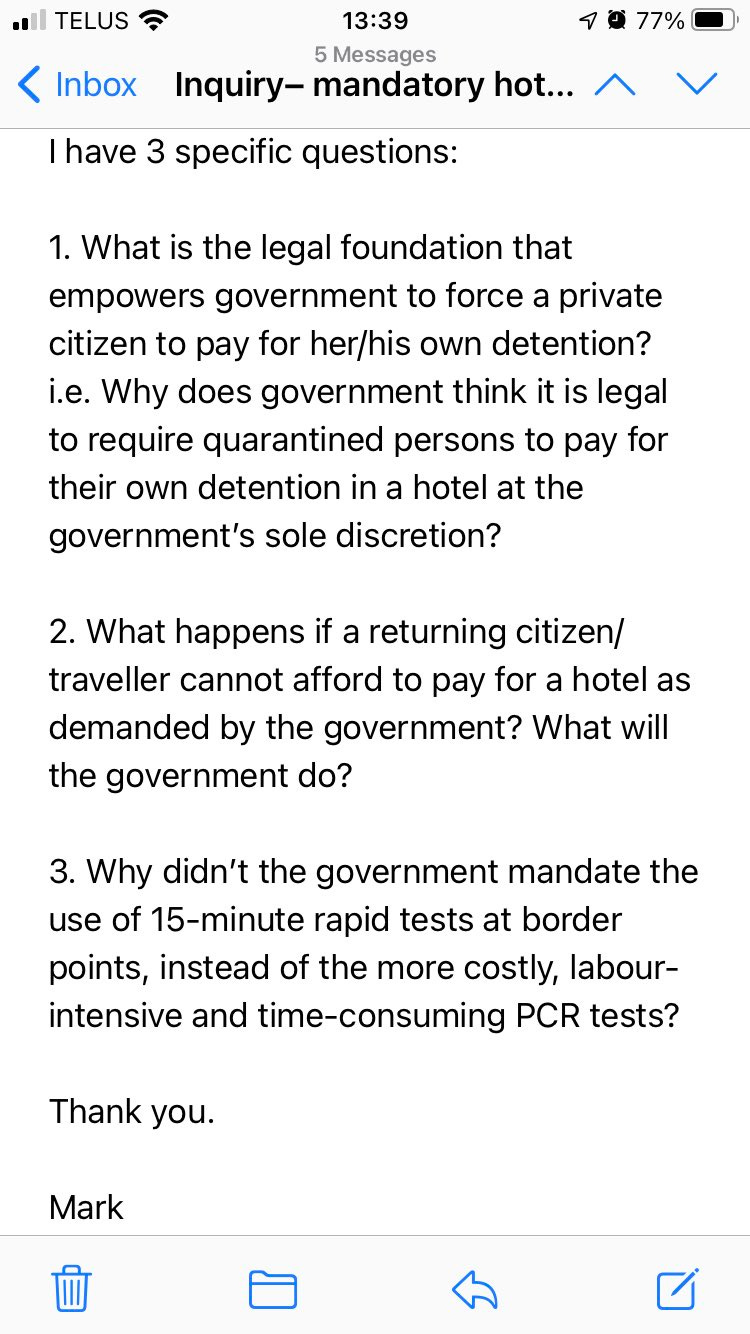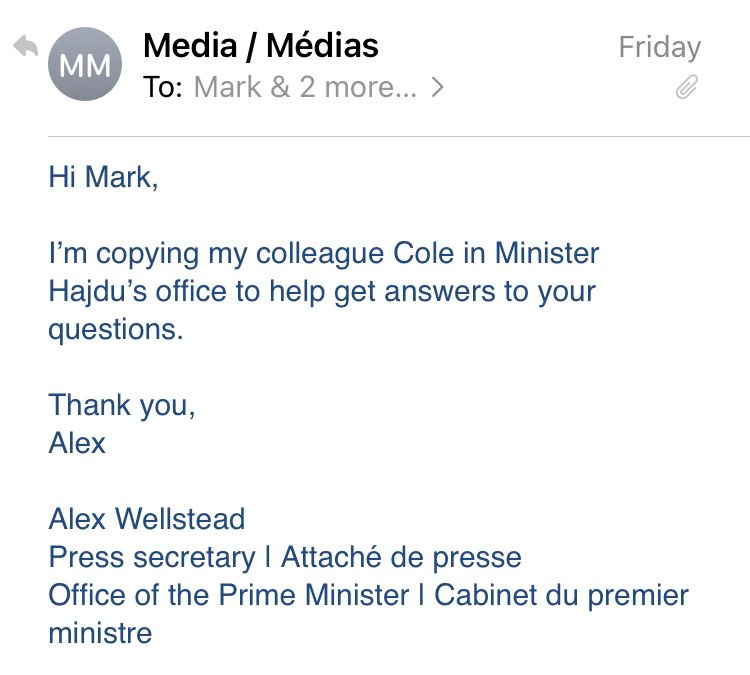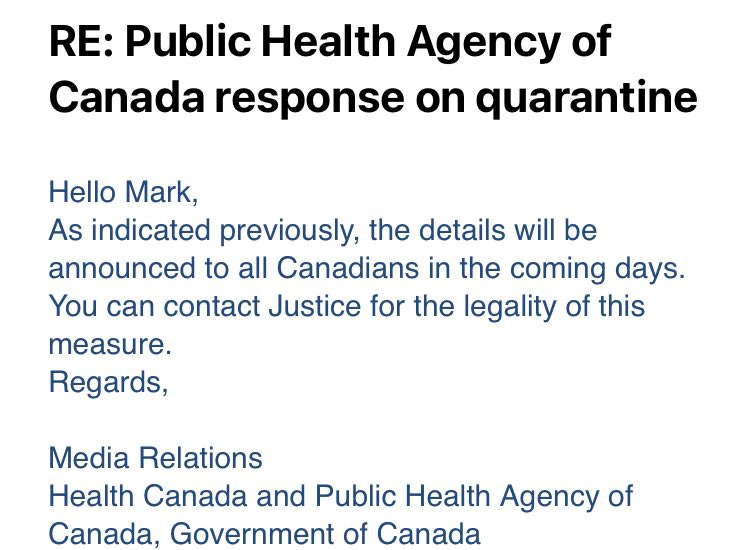Detention without trial: Canada or China?
Trudeau's new user-pay quarantine scheme may not be legal
Canadians are being arbitrarily apprehended by government and forced into detention at secret locations without being charged, with no right to access counsel or inform family. They do not know when they will be released or why. They are being subjected to invasive medical testing.
This is not happening in China.
This is happening to Canadians – in Canada.
The government of Canada has begun implementing its threat to apprehend travellers entering the country and force them into detention at a hotel near their port of entry, pending the result of a government supervise COVID-19 test that takes three days.
Prime Minister Justin Trudeau announced this program last week with the additional promised that travellers would be forced to pay for their own stay in detention.
When I asked the Prime Minister’s Office whether his plan was legal. Nobody knew.
Habeas corpus or no habeas corpus?
Detention without conviction is a violation of fundamental rights and freedoms. So, it must be used only in extraordinary circumstances. Just look how difficult it is to convince a judge that a gang-banger with a list of violent offences on his record to be denied bail on a similar charge. Until he’s proven guilty, he’s not guilty and has a right to be free.
While I expect government could make a case to detain travellers entering Canada, and probably should make a case to so, it hasn’t even tried. Nor, does it appear to know how.
When I asked the Prime Minister’s Office last week what law makes their mandatory hotel quarantine program legal, I was shocked to find out nobody in the PMO or the Minister of Health’s office could answer me.
The Quarantine Act clearly gives government extraordinary powers to detain anyone with a communicable disease – or suspected to have one. This is for the public good and makes sense.
But, the same Act doesn’t appear to give government any power to detain someone who is not infected – or even suspected of being infected.
No law in Canada gives government the power to force a detainee to pay the cost of their involuntary detention.
So, what evidence could there be that a traveller would warrant abandoning the principle of Habeas Corpus?
First, to get on any aircraft to Canada, a traveller must present proof of a negative result on a legitimate test showing they are not infected with coronavirus. Therefore, when those travellers arrive in Canada, they will have one document establishing they are not infected.
In Ontario, those travellers must also now take a Rapid Test on arrival. If that’s negative, the traveller now has two pieces of documentary evidence stating they are not infected.
Now, the federal government wants to order that same traveller into detention pending the results of a third COVID-19 test. The traveller will be detained in custody until the results of that test are received.
What evidence is required to substantiate detention?
As I understand it, the Quarantine Act gives government agents the power to detain a person if they reasonably believe that person is “infested.” The language of the Act is delightfully archaic.
On what grounds can those agents legitimately draw this conclusion?
At the point of apprehension – attempting to leave the airport – the traveller will have two documents attesting he or she is not infected. On the other hand, the government will have zero documents saying otherwise.
Is zero evidence enough evidence to suspend the fundamental freedom of Canadians?
I don’t think so. And, I don’t think the Court will either.
What if you just don’t pay?
It’s politically attractive to say the bad guys will pay for their detention. Believe me, I’d love to force convicted pedophiles, rapists and murders to pay for their own room and board - at the actual cost. But, that’s not what we do in Canada.
We recognize there is a clear public benefit from locking up criminals – so we, as a society, have agreed to pay for it.
Can the government force a traveller to pay for his mandatory detention in an airport hotel – at a cost of $2,000 for a three day stay, according to the Prime Minister? Mr. Trudeau’s staff didn’t know the answer to that. Neither did the Health Minister’s staff.
Here’s a helpful hint: No. It is not.
Government has no legal authority to force a prisoner to pay for her prison. If they did, our prisons and jails would be a revenue-producing arm of the government. They aren’t.
What happens if you just don’t pay?
The Canadian government can’t answer that question either. I asked them. They couldn’t say.
What if you just refuse to hand over your credit card to a hotel clerk? They’ll send you away. Problem solved. Canada “unprotected.” Will they bill you?
Maybe, you’ll be arrested. Given the choice between paying an exorbitant amount for a hotel stay I do not want and cannot afford, I would probably choose to be arrested.
After all, criminals get free room and board.
What government should do:
Keep the current mandatory 72-hour pre-travel test requirement and the on-arrival rapid test for all travellers.
If you test negative (no infection) on both tests – go home, stay there, observe a (preferably shortened) self-quarantine with government surveillance as happens now.
There should be an option to take a third test, some number of days after arrival that makes sense to testing experts. If that’s negative, you should be released from quarantine.
If you test positive on the arrival test – you should be ordered into government-supervised mandatory quarantine at a local hotel. Secure transportation should be provided to the hotel room.
All costs incurred in Canada should be borne by the government –keeping the virus out of the population is a clear public benefit. This includes cost of arrival tests, follow up tests and mandatory government supervised quarantine in a hotel.








Mark, that would just make too much sense and this government I incapable of doing anything remotely close to that. We live in Peoples Republic of Canada...just accept it.